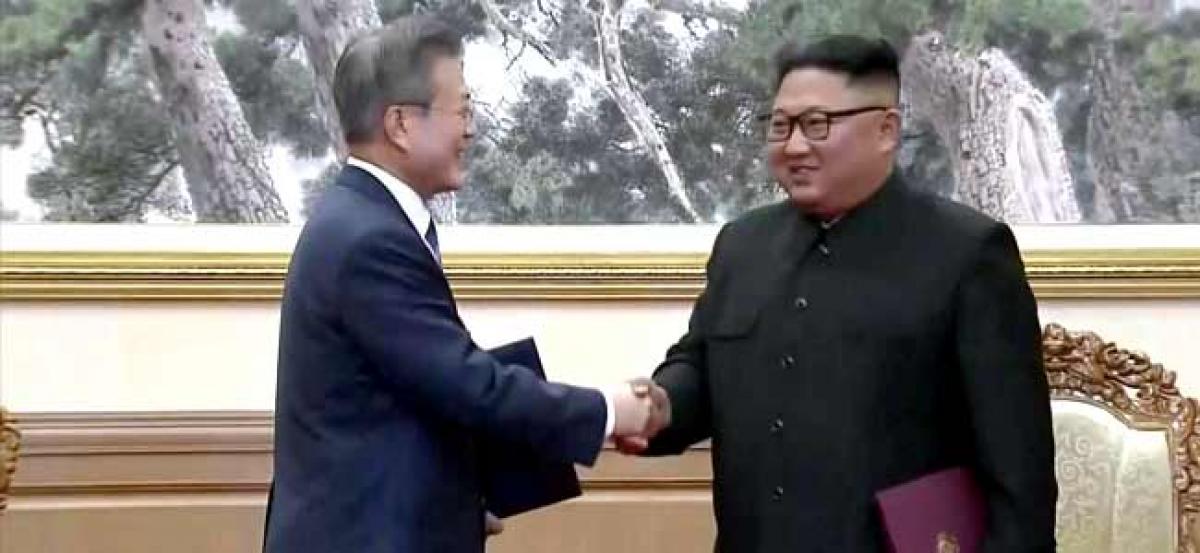Live
- Chandrababu urges PM Modi for financial assistance to AP
- Telangana CM Revanth Reddy meets film industry key members, discusses key issues
- Naveen Polishetty’s ‘Anaganaga Oka Raju’ sparks excitement with teaser release
- 'Ajay Maken works at BJP’s behest': AAP seeks Congress expulsion from INDIA bloc
- Rashmika Mandanna Discusses Challenges Filming ‘Peelings’ Song in Pushpa 2
- Hyderabad Weather Update: Light Rain and Overcast Conditions Persist
- Their courage forms foundation of India's democracy: PM Modi remembers Sahibzades
- Garena Free Fire MAX Redeem Codes for December 26, 2024: Unlock Exclusive Rewards
- Kohli to be fined for on-field altercation with Konstas at MCG
- CM Chandrababu Naidu Seeks Support for Revival of Visakhapatnam Steel Plant
Just In

North Korea has agreed to permanently abolish its key missile facilities in the presence of foreign experts, and is willing to close its main nuclear complex if the United States takes reciprocal action, South Koreas President Moon Jaein said on Wednesday
North Korea has agreed to "permanently" abolish its key missile facilities in the presence of foreign experts, and is willing to close its main nuclear complex if the United States takes reciprocal action, South Korea's President Moon Jae-in said on Wednesday.
Speaking at a joint news conference following their summit talks in Pyongyang, Moon and North Korean leader Kim Jong Un said they agreed to turn the Korean peninsula into a "land of peace without nuclear weapons and nuclear threats." Kim said he will visit Seoul in the near future, in what would be the first-ever visit to the South's capital by a North Korean leader. The latest summit will be a litmus test for stalled negotiations on the North's nuclear programme between Pyongyang and Washington, and for another meeting Kim recently proposed to U.S. President Donald Trump following their historic encounter in June in Singapore.
Moon was seeking to engineer a proposal that combines a framework for the North's denuclearisation and a joint declaration ending the 1950-53 Korean War. Kim pledged to work toward the "complete denuclearisation of the Korean peninsula" during his first encounter with Moon, and at his summit with Trump in June. But discussions over how to implement the vague commitments have since faltered, with Washington demanding concrete action towards denuclearisation by North Korea before agreeing to a key goal of Pyongyang - declaring an end to the war.
North Korea has given no indication it is willing to give up its nuclear arsenal unilaterally and is seeking relief from crippling international sanctions. North Korea has offered to stop nuclear and missile tests but did not allowed international inspections for a dismantlemnt of its only known nuclear site in May, drawing criticism that its action could not be verified and could be easily reversed.
ART TOUR
U.S. State Department spokeswoman Heather Nauert told a news briefing on Tuesday that Washington hoped the latest inter-Korean summit would bring about "meaningful, verifiable steps towards the denuclearisation of North Korea" and called it a "historic opportunity" for Kim to follow through on commitments he made with Trump. Later on Wednesday, Moon's delegation will tour the Mansudae Art Studio, the North's largest producer of art where state artists build statues and produce propaganda at a sprawling complex in Pyongyang. The institution was sanctioned by the U.N. Security Council last year as part of global efforts to rein in Pyongyang's nuclear and missile programmes by drying up its revenue sources.
Moon is also scheduled to watch the North's signature "Brilliant Fatherland" Mass Game which was reintroduced this year following a five-year hiatus, with a formation of glowing drones, lasers and stadium-sized gymnastics shows designed to glorify the country. The United States is pressing countries to strictly observe international sanctions, which will likely be a key theme when Secretary of State Mike Pompeo hosts a Security Council meeting on North Korea on Sept. 27 on the sidelines of the annual U.N. General Assembly.
"NEW ERA"
This week's summit is intended to craft concrete steps to implement the Panmunjom Declaration, named after the border village where they first met, Seoul officials said. The two Koreas also adopted a separate military accord aimed at preventing armed clashes between the old foes, which are technically still at war because the Korean War ended with a truce, not a peace treaty. The neighbours have already agreed to withdraw some guard posts and equipment, in a bid to transform the world's most heavily fortified border into a no-weapons area. Pyongyang says it has destroyed its main nuclear and missile engine test site, and has halted atomic and ballistic missile tests, but U.S. officials and analysts believe it is continuing to work on its weapons plans clandestinely.
South Korea is pinning high hopes on Kim's remarks to Moon's special envoys earlier this month that he wanted to achieve denuclearisation within Trump's first term in office ending in early 2021. Kim at the same time also stressed Washington must reciprocate his initial "goodwill" gestures. While Moon has expressed his desire to agree on a concrete plan on denuclearisation, we believe that the two nations still differ on this concept," said Anwita Basu, an analyst at the Economist Intelligence Unit.
In previous, failed talks, North Korea has said it could consider giving up its nuclear programme if the United States provided security guarantees by removing troops from South Korea and withdrawing its so-called nuclear umbrella of deterrence from the South and Japan. U.S. officials involved in the latest negotiations have said North Korea has refused to even start discussions about defining denuclearisation.

© 2024 Hyderabad Media House Limited/The Hans India. All rights reserved. Powered by hocalwire.com







